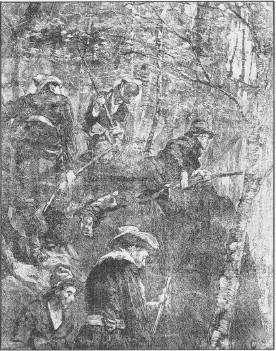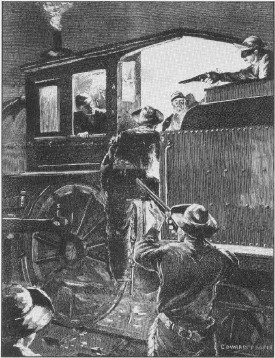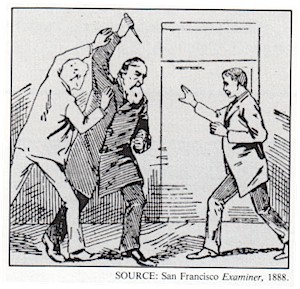|

Moonshiners ambush Deputies and
Internal Revenue Agents during the 'moonshine wars'. Following the
Civil War, U.S. Marshals assisted the Internal Revenue agents (who had
no arrest powers) in enforcing the whiskey tax laws against moonshiners.
Source: Harper's Weekly, Nov. 2, 1878

Train robbery was not a Federal
offense unless the robbers stole U.S. mail, which most did. Source:
Harper's Weekly, wood engraving, , January 16, 1892
|
 |
Nor was opposition to the federal
government restricted to individual citizens or groups of
citizens. State and local governments also took umbrage at Federal
measures. Their anger, too, was often directed at individual Marshals
who suffered interference, arrest, and imprisonment as a result.
In March 1809, the Pennsylvania state legislature passed a resolution
calling on all citizens to resist Marshal John Smith's court-ordered
efforts to collect money from the state in the complicated Olmstead
Case.
When the Marshals went to the house of one of the defendants with a
writ of attachment in hand, eight state militiamen greeted him with
bayonets. "In the name and by the authority of the United States, I
command you to lay down your arms and permit me to proceed," Marshal
Smith declared. "In the name and by the authority of the Commonwealth of
Pennsylvania. I command you to
resist him," ordered General Bright, the commander of the squad. Turning
to Marshal Smith, Bright warned that any further effort to enter the
property would be "at the peril of your life."
The Marshal, after taking down the names of the militiamen, returned
to the courthouse, where he promptly called on the Secretary of' State
for permission to raise a posse of 2,000 men. The next day, Smith
went back alone to the defendant's house, which was still guarded by
General Bright and his men. Circling around back onto Cherry
Street, he scaled the the fence and served his process on the defendant
through the back door. Later, General Bright and his men were indicted
and found guilty of resisting a federal court order. Bright was
sentenced to three months imprisonment, his men to one month. All were
later pardoned by President James Madison.
Other instances of interference by the local governments abound.
After the civil war, dozens of Deputies were incarcerated in Southern
jails as a result of their efforts to enforce Federal laws. Deputy
W.B. Blackburn was indicted by the Circuit Court of Tuscaloosa County,
Alabama, in 1844 for carrying a concealed weapon. The evidence
used against Backburn consisted of eyewitness accounts of two
moonshiners he had arrested.
Other Deputies were arrested for murder or
attempted murder, depending on the results of their gunfights with moonshiners and other criminals. Because the Marshals enforce federal
laws in their
local areas, they are easy targets for state and local authorities to
vent their frustration over federal measures.

In 1889, Neagle shot and killed David Terry, who had
attacked Supreme Court Justice Stephen Fields. Arrested for
murder, the Supreme Court ordered Neagle released in a landmark case
that set precedents for the power of the executive branch of our
goverment. |



